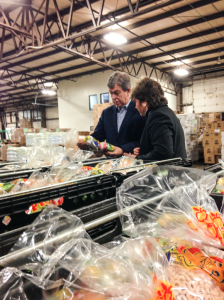
Sen. Roy Blunt tours the Food Bank of Central and Northwest Missouri in Columbia, Mo. (PoliticMo Photo)
COLUMBIA, Mo. – Standing on the distribution floor of The Food Bank for Central and Northeast Missouri, U.S. Sen. Roy Blunt said Monday charitable giving is tied closely to tax policy – and that he favors expanding tax incentives for giving.
“I was a university president for four years, I’ve been on lots of boards for years, and tax policy makes a difference in giving. The only people who don’t think it does are the people who haven’t raised any money,” Blunt said. “It doesn’t for every single contributor, but it does for enough contributors that it is the difference between whether your meet your goal or not and whether somebody decides it is worth the effort perhaps to get food to the food bank as opposed to just get rid of that product in some other way.”
Last year as part of the deal to avert the so-called ‘fiscal cliff’ (a combination of automatic spending cuts and the expiration of the Bush-era tax cuts), Congress passed a law reducing the amount of charitable giving higher earners could deduct from their taxes by three percent on income exceeding the $250,000 individual threshold. Someone making $400,000, for example, and contributing $50,000 to charity could only claim $47,000 – $3,000 less than they could before.
Blunt said the charitable giving tax reductions – which he and former Democratic U.S. Rep. Harold Ford Jr. expanded in 2003 – as well as the homeowner mortgage tax deductions are some of the most popular individual tax credit programs at the federal and said he is in favor of sustaining them.
Blunt’s visit to the area food bank came as they were experiencing a year of increased demand, up 22 percent from 2012, and the year is not yet over. According to officials from the food bank, Missouri has experienced the highest rate of increase in the ‘very low’ food security rate.
During his visit, Blunt helped prepare “buddy packs,” which the food bank sends to more than 150 schools to help provide students who qualify for free and reduced lunches some food for the weekends. A striking 50,000 students in the region qualify for free and reduced lunches, but the food bank is only able to provide the “buddy packs” to less than half.
“It’s easy when you’re in a high food producing environment to assume everybody has access to that food. That’s not accurate,” he said. “Access to food and to quality of food that kids need to grow and learn, and older people need to sustain themselves in their less active years, is all important, and that’s why things like the food bank matter.”
